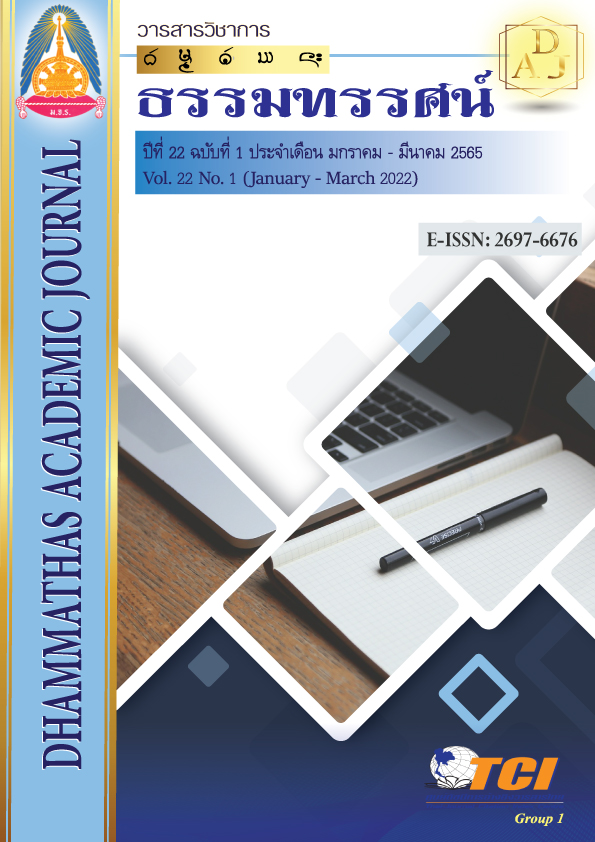Instructional Contemplative Education Based Blended on Action Learning of Strengthen the Ability to Development of Curriculum
Main Article Content
Abstract
The purposes of this research are as follows: 1) to study the results of instructional contemplative education based blended on action learning of strengthen the ability to development of curriculum, 2) to evaluate ability to develop courses and the level of satisfaction student in instructional contemplative education based blended on action learning of strengthen the ability to development of curriculum. This study was conducted by means of the experimental research methodology and selected a specific samples method included 32 people undergraduate students in King Mongkut’s University of Technology North Bangkok (KMUTNB) enrolling in the Education Philosophy and
Vocational Curriculum Development course in the second semester of 2020. The instruments used to collect the data included a five-point Likert scale consists of the evaluation form of questions to item appropriateness and congruence for efficient activity assessment, an evaluation form of the ability to development of curriculum and an evaluation form for effective activities. The statistics used for data analysis included frequency, percentage, means, standard deviation and a dependent t-test.
The research results found that:
1. Instructional contemplative education based blended on action learning of strengthen the ability to development of curriculum activities was categorized into 5 steps which were the deep listening, careful planning action, action consideration, follow true, and relational action learning. Further results were evaluated by experts and found that such effective activities could be implemented in real situations.
2. The evaluation results of ability to develop courses activities showed that the students had a higher significant score after participating in the activity at a level of .01 Overall, students’ satisfaction towards the learning management was at the highest level, higher than the criteria, with a significant level of .01.
Article Details

This work is licensed under a Creative Commons Attribution-NonCommercial-NoDerivatives 4.0 International License.
เพื่อให้เป็นไปตามกฎหมายลิขสิทธิ์ ผู้นิพนธ์ทุกท่านต้องลงลายมือชื่อในแบบฟอร์มใบมอบลิขสิทธิ์บทความ ให้แก่วารสารฯ พร้อมกับบทความต้นฉบับที่ได้แก้ไขครั้งสุดท้าย นอกจากนี้ ผู้นิพนธ์ทุกท่านต้องยืนยันว่าบทความ ต้นฉบับที่ส่งมาตีพิมพ์นั้น ได้ส่งมาตีพิมพ์เฉพาะในวารสาร วิชาการธรรม ทรรศน์ เพียงแห่งเดียวเท่านั้น หากมีการใช้ ภาพหรือตารางของผู้นิพนธ์อื่นที่ปรากฏในสิ่งตีพิมพ์อื่นมาแล้ว ผู้นิพนธ์ต้องขออนุญาตเจ้าของลิขสิทธิ์ก่อน พร้อมทั้ง แสดงหนังสือที่ได้รับการยินยอมต่อบรรณาธิการ ก่อนที่บทความจะได้รับการตีพิมพ์References
คัทรียา รัตนวิมล และคณะ. (2563). ผลการใช้รูปแบบการเรียนการสอน S SMILE Model ตามแนวคิดจิตตปัญญาศึกษาเพื่อพัฒนาทักษะ 5 ด้านของนิสิตพยาบาล ตามกรอบมาตรฐานคุณวุฒิระดับอุดมศึกษาแห่งชาติ. วารสารพยาบาลทหารบก, 21(2), 262-272.
จิรัฐกาล พงศ์ภคเธียร. (2550). การวิจัยและพัฒนาจิตตปัญญาศึกษาในสถาบันอุดมศึกษาไทย. กรุงเทพฯ: จุฬาลงกรณ์มหาวิทยาลัย.
ประเวศ วะสี. (2553). คำบรรยายเรื่อง การศึกษาที่พาชาติออกจากวิกฤติ. กรุงเทพฯ: มหาวิทยาลัยธุรกิจบัณฑิตย์.
พระพรหมคุณาภรณ์ (ป.อ. ปยฺตฺโต). (2546). พจนานุกรมพุทธศาสตร์ ฉบับประมวลธรรม. เข้าถึงได้จาก https://84000.org/tipitaka/dic/d_item.php?i=93
พระศุภเดช ธมฺมธโร (สัตถาผล), สมควร นามสีฐาน และประยูร แสงใส. (2564). การพัฒนาชุดการสอนเรื่อง อิทธิบาท 4 สำหรับนักเรียนชั้นมัธยมศึกษาปีที่ 3 โรงเรียนห้วยยางวิทยาสรรพ์ จังหวัดขอนแก่น. วารสารวิชาการธรรมทรรศน์, 21(2), 65-74.
พิณสุดา สิริธรังศรี. (2557). การยกระดับคุณภาพ ครูไทยในศตวรรษที่ 21. กรุงเทพฯ: สำนักงานส่งเสริมสังคมแห่งการเรียนรู้และคุณภาพเยาวชน.
ภวิกา ภักษา. (2563). จิตตปัญญาศึกษา: การจัดการเรียนรู้สำหรับผู้เรียนในระดับอุดมศึกษา. วารสารศึกษาศาสตร์ มหาวิทยาลัยมหาสารคาม, 14(4), 7-18.
มะลิวัน สมศรี และคณะ. (2558). การพัฒนาคู่มือพัฒนาสมรรถนะทางวิชาการของครูผู้สอนในสถานศึกษา สังกัดสำนักงานเขตพื้นที่การศึกษาประถมศึกษาอุดรธานี เขต 2. วารสารศึกษาศาสตร์ มหาวิทยาลัยมหาสารคาม, 9(พิเศษ), 542-557.
ยูนิเซฟ ประเทศไทย. (2563). รายงานเบื้องต้น การสำรวจผลกระทบและความต้องการของเด็กและเยาวชนในสถานการณ์โควิด-19 ผลสำรวจออนไลน์ ระหว่างวันที่ 20 มีนาคม ถึง 10 เมษายน 2563. เข้าถึงได้จาก https://www.unicef.org/thailand/th/media/4031/file
วรวรรณ วาณิชย์เจริญชัย. (2553). การเรียนรู้จากการปฏิบัติ: การประยุกต์ใช้ในการเรียนการสอน. Journal of Nursing Science, 28(4), 36-44.
วิจักขณ์ พานิช. (2550). เรียนรู้ด้วยใจอย่างใคร่ครวญ การศึกษาดั่งเส้นทางแสวงหาทางจิตวิญญาณ. กรุงเทพฯ: สวนเงินมีนา.
สำเริง บุญเรืองรัตน์. (2558). การเรียนรู้จากการปฏิบัติ. สารานุกรมศึกษาศาสตร์ คณะศึกษาศาสตร์ มหาวิทยาลัยศรีนครินทรวิโรฒ, 49, 57-59.

